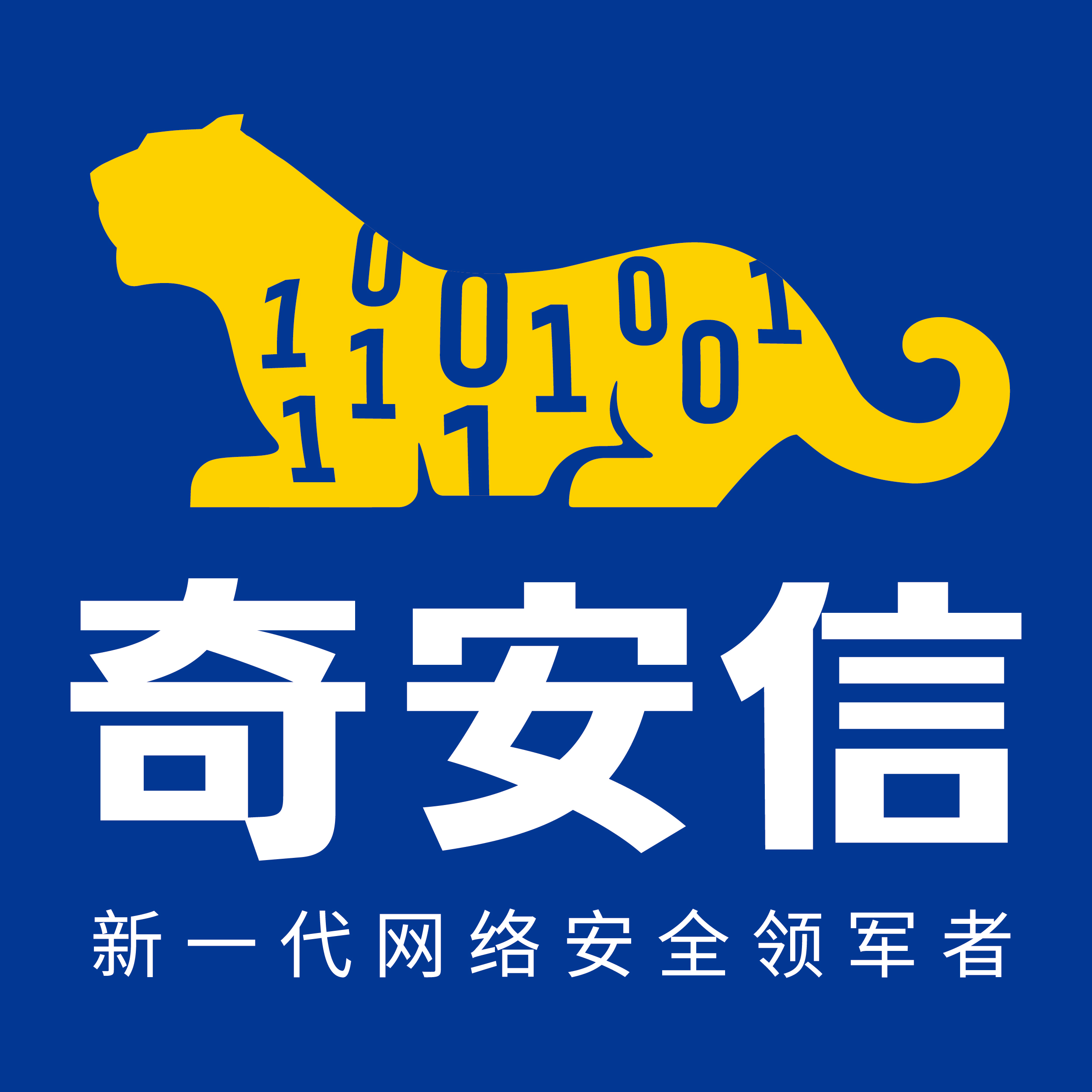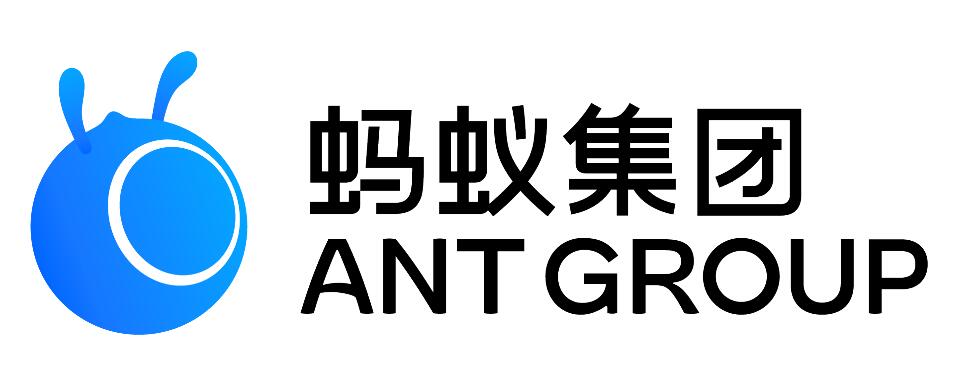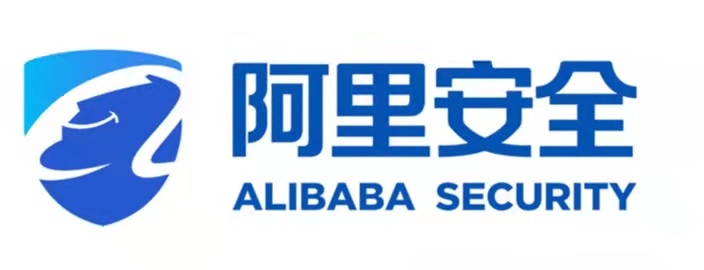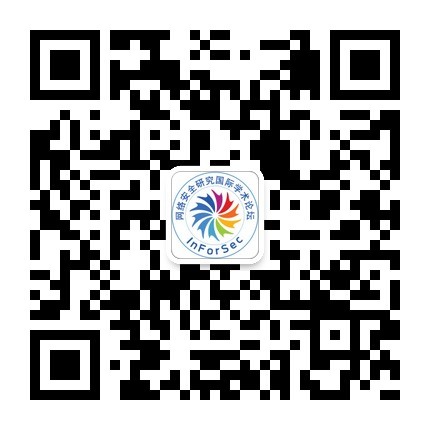首届ISOC (Internet Society) Symposium on Vehicle Security and Privacy (VehicleSec’23)将在2023 年 2 月 27 日与安全顶会NDSS 2023 合办。考虑到疫情影响,本次将以线上线下结合(Hybrid)形式举行,其中线下部分将在加利福尼亚州圣地亚哥的 Catamaran Resort Hotel & Spa举办。VehicleSec会议的创立是基于多年成功与NDSS合办的 AutoSec (Automotive and Autonomous Vehicle Security) Workshop,将继续致力于智能车/无人机/交通的安全问题和相关社区发展。
VehicleSec的投稿范围以及相关活动
· 投稿范围:任何和“vehicle”相关的安全及隐私问题。“Vehicle”既包括陆地上的(e.g., cars, bicycles, motorcycles, trucks, buses, scooters, train),也包括空中的(e.g., drones, airplanes, helicopters, spacecraft)、水下的(ships, boats, watercraft)、空间的(spaceship)等等。“Vehicle”的安全隐私问题既包括“vehicle”系统本身,也包括相关的子系统(e.g., in-vehicle networks, autonomy, connectivity, human-machine interfaces)、基础设施(e.g., transportation infrastructure, ground control station)、社会问题(human factors, trustworthiness,ethics)等等。
· 投稿形式:接收长论文、短论文和demo/poster。长论文 6-8页,短论文4页,demo/poster 1页,均不包括参考文献和附录。
· 会议奖项:参照之前多届AutoSec Workshop,此次VehicleSec Symposium对于长/短论文和demo/poster均设立最佳奖项(Best Paper Awards,Best Demo/Poster Awards,等)。同时还设立特色奖项AutoDriving Security Award,用于奖励对自动驾驶技术的安全有突出贡献的文章。所有奖项都包含现金奖励(cash prize),比如AutoDriving Security Award去年为2000刀。
· 学生福利:本届VehicleSec的赞助支持,将会给学生作者提供Travel Grants。
· 社区活动:在会议当天(2023年2 月 27 日)晚会举办第一次社区欢迎会(Community Reception),将提供丰富的餐食,促进社区线下交流。
欢迎有兴趣的老师同学踊跃投稿,共同促进智能车/无人机/交通安全的研究和社区发展!更多详情请见下方的正式CFP或访问官网:https://www.ndss-symposium.org/ndss2023/submissions/cfp-vehiclesec/。
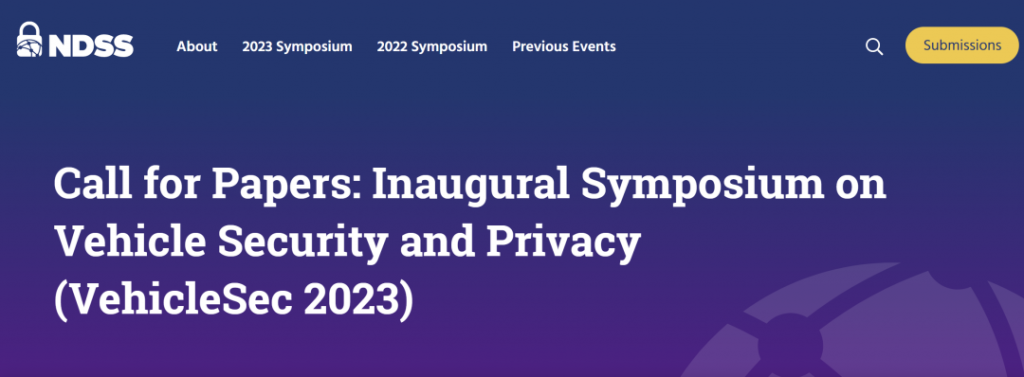
Call for Papers: Inaugural ISOC Symposium on Vehicle Security and Privacy (VehicleSec 2023)
Co-located with NDSS 2023, San Diego, CA (Hybrid)
(Previously AutoSec w/ NDSS:https://www.ndss-symposium.org/ndss-program/autosec-2022/)
A vehicle is a machine that transports people and/or cargo in one or more physical domains, such as on the ground (e.g., cars, bicycles, motorcycles, trucks, buses, scooters, trains), in the air (e.g., drones, airplanes, helicopters, spacecraft), and under water (ships, boats, watercraft). Due to their safety-critical nature, the security and privacy of vehicles can pose direct threats to passengers, owners, operators, as well as the environment. Recent improvements in vehicle autonomy and connectivity (e.g., autonomous driving, drone delivery, vehicle-to-everything (V2X) communication, intelligent transportation, drone swarm), have only served to exacerbate security and privacy challenges and thus require urgent attention from academia, industry, and policy-makers. To meet this critical need, the ISOC (Internet Society) VehicleSec symposium aims at bringing together an audience of university researchers, scientists, industry professionals, and government representatives to contribute new theories, technologies, and systems on any security/privacy issues related to vehicles (e.g., ground, aerial, underwater), their sub-systems (e.g., in-vehicle networks, autonomy, connectivity, human-machine interfaces), supporting infrastructures (e.g., transportation infrastructure, ground control station), and related fundamental technologies (e.g., sensing, control, AI/ML/DNN, real-time computing, edge computing, location service, simulation, digital twin, multi-agent protocol/system design, and human-machine interaction).
VehicleSec 2023 will be a hybrid event, in conjunction with the Network and Distributed System Security Symposium (NDSS) 2023 at San Diego, CA.
Community Reception. VehicleSec will host a reception as a community social event on the night of the symposium (Feb 27, 2023), with refreshments such as food and drinks.
Demo/Poster Session: VehicleSec will feature a demo/poster session (in-person) to allow academic, governmental, and industry participants to present posters and/or share demonstrations of their latest attacks, defenses, and security/privacy tools or systems related to vehicles.
Lightning Talk Session: The symposium will feature a Lightning Talks session with short and engaging 5-minute “live” (in-person) presentations on any topics that can be worth a timely shout-out to the VehicleSec community, which includes but not limited to emerging hot topics, preliminary research results, practical problems encountered, lessons learned, the introduction of tutorials and education materials, tips and tricks, simulators/simulations, data and visualizations (e.g., autonomous driving datasets), or other (interdisciplinary) topics related to vehicles.
Awards: Accepted papers and demos/posters will be considered for a Best Paper Award and Best Demo/Poster Award. The winner and runner-up will receive cash prizes. In addition, a special AutoDriving Security Award, with a cash prize, will be given to one of the accepted papers to recognize and reward research that makes substantial contributions to secure today’s autonomous driving technology.
Travel Grants: Selected students will be provided with support to attend the symposium in person.
Submission Guidelines for Papers/Demos/Posters:
We accept (1) regular papers of 6-8 pages, (2) short position papers or work-in-progress (WIP) papers up to 4 pages, and (3) demo/poster papers up to 1 page, all in double-column NDSS format. Page limits exclude bibliography and well-marked appendices. There is no limit on the length of the bibliography and appendices at submission time, but reviewers are not required to read any appendices so the paper should be self-contained without them. For regular papers, shorter papers won’t be penalized; thus, authors are encouraged to submit papers of appropriate length based on the research contribution.
Submissions should be anonymized for review but this is not required. Demo/poster/short/WIP papers must have the prefix “Demo:”/”Poster:”/”Short:”/”WIP:” in their titles. The submission portal will be released soon.
The proceedings will be published and archived by the Internet Society (ISOC).
Submission Guidelines for Lightning Talks:
Please submit your Lightning Talk title and abstract (200 words or less) for full consideration via the Lightning Talk submission form below by February 3, 2023. Lightning Talk abstracts will be published on the symposium website.
https://forms.gle/XLZBeYNLyNw8d4Pa9
●All submissions must include the presenter’s name, affiliation, and contact information.
●Please note that the presenter must make all submissions. Submissions from PR firms will be rejected without review.
●Time limits will be strictly enforced.
●For additional information regarding Lightning Talks, do not hesitate to contact the Lightning Talk Chair Ming Li at lim@arizona.edu.
Topics of interest include but are not limited to:
●Embedded/sensor/analog/actuator security, privacy, and forensics in vehicle settings
● Vehicle-related malware/firmware analysis
●Secure/resilient/trustworthy/privacy-preserving perception, localization, planning, and control in autonomous/automated vehicles
●Security/safety/robustness verification related to vehicles
●Intra- and inter-vehicle network (e.g., CAN bus, V2X, remote operator channel) security
●Multi-vehicle coordination/cooperation (e.g., V2X, drone swarm) security
●Compliance with policies (e.g., legal, security, privacy, safety, and environmental policies)
●Secure integration of hardware and software systems for vehicles (e.g., ground, aerial)
●Secure software/hardware updates in vehicle settings (e.g., cars, drones, airplanes)
●Privacy challenges in vehicle settings, e.g., driver/passenger privacy, drone/car/robot spying, intellectual property stealing, etc.
●Privacy-preserving data sharing and analysis in vehicle settings
●Security/privacy in electric, medium- and heavy-duty vehicle systems
●Security/privacy in Intelligent Transportation Systems (ITS), e.g., intelligent traffic light
●Security/privacy for vehicle-related supporting infrastructure (e.g., charging)
●Secure vehicle-related software/hardware development process (e.g., debugging tools, simulators, testbed) and their own security/privacy
●Security/privacy of any vehicle-related fundamental technologies (e.g., sensing, control, AI, location service, IoT, etc.)
●Human factors, trust, humans in the loop, and usable security related to vehicles
●Security/privacy/resilience-related metrics and risk assessment for vehicles
Important Dates
●Paper/Poster/Demo Submission Deadline: Anywhere-on-earth (AOE) January 3, 2023
●Lightning Talk Submission Deadline: February 3, 2023
●Notification of Acceptance: February 10, 2023
●Camera Ready Submission: February 17, 2023
●Symposium Date: February 27, 2023
●Community Reception Date: February 27, 2023 (at night)
General Chairs
Alfred Chen, University of California, Irvine
Ziming Zhao, University at Buffalo
Program Chairs
Z. Berkay Celik, Purdue University
Ryan Gerdes, Virginia Tech
Lightning Talk Chair
Ming Li, University of Arizona
Demo/Poster Chair
Sara Rampazzi, University of Florida
Web Chair
Mert Pesé, Clemson University
Publication Chair
Aiping Xiong, Penn State University
Travel Grant Chair
Hyungsub Kim, Purdue University
Technical Program Committee
Houssam Abbas, Oregon State University
Qadeer Ahmed, Ohio State University
Antonio Bianchi, Purdue University
Gedare Bloom, U of Colorado Colorado Springs
Yulong Cao, University of Michigan
Alvaro Cardenas, University of California Santa Cruz
Dongyao Chen, Shanghai Jiao Tong University
Michael Clifford, Toyota
Jeremy Daily, Colorado State University
Bruce DeBruhl, Cal Poly
Soteris Demetriou, Imperial College London
Georgios Fainekos, Toyota Research Institute of N. America
Yiheng Fen, Purdue University
Earlence Fernandes, U of California San Diego
Tom Forest, General Motors
Xiali Hei, University of Louisiana at Lafayette
Bardh Hoaxa, Toyota Research Institute of N. America
Hongxin Hu, University at Buffalo
Shalabh Jain, Bosch Research
Murtuza Jadliwala, U of Texas at San Antonio
Xiaoyu Ji, Zhejiang University
Yongdae Kim, KAIST
Chung Hwan Kim, University of Texas at Dallas
Taegyu Kim, Pennsylvania State University
Hyungsub Kim, Purdue University
Vireshwar Kumar, IIT Delhi
Ming Li, University of Arizona
Xiaojing Liao, Indiana University
Zhiqiang Lin, Ohio State University
Peng Liu, Pennsylvania State University
Wenjing Lou, Virginia Tech
Mulong Luo, Cornell University
Eleonora Losiouk, University of Padua
Xiapu Luo, HongKong Polytechnic University
Miroslav Pajic, Duke University
Christos Papadopoulos, University of Memphis
Karthik Pattabiraman, University of British Columbia
Mert Pesé, Clemson University
Jonathan Petit, Qualcomm
Sara Rampazzi, University of Florida
Indrakshi Ray, Colorado State University
Neetesh Saxena, Cardiff University
Khaled Serag, Purdue University
Weisong Shi, Wayne State University
Yasser Shoukry, University of California, Irvine
David Starobinski, Boston University
Dave (Jing) Tian, Purdue University
Yuan Tian, University of Virginia
Lan Wang, University of Memphis
André Weimerskirch, Lear Corporation
Aiping Xiong, Pennsylvania State University
Luyi Xing, Indiana University
Qiben Yan, Michigan State University
Min Yang, Fudan University
Fengwei Zhang, Southern U of Science & Technology
Ning Zhang, Washington University at St. Louis
Qi Zhu, Northwestern University
Steering Committee
Gail-Joon Ahn, Arizona State University
David Balenson, USC Information Sciences Institute
Chunming Qiao, University at Buffalo
Mani Srivastava, University of California, Los Angeles
Gene Tsudik, University of California, Irvine
Dongyan Xu, Purdue University





